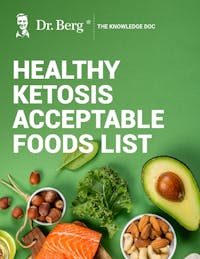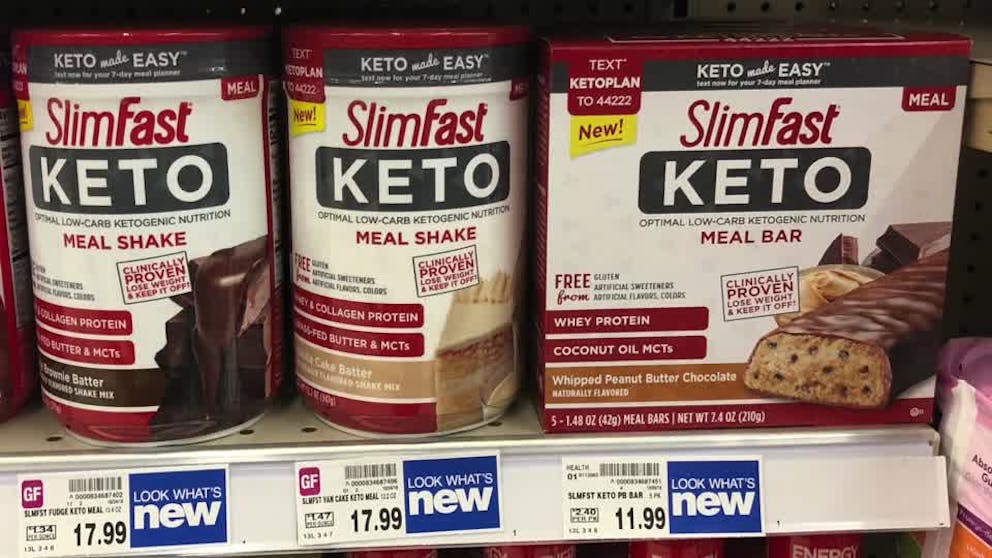3 Worst Ingredients In So-Called Keto-Friendly Foods

Maltodextrin – #1 Worst Ingredient Hiding in Your Foods
Discover why maltodextrin is a highly problematic ingredient found in processed foods
Understand the detrimental impact of maltodextrin on metabolic health and weight gain
Learn about hidden sources of maltodextrin and how to spot this harmful ingredient on labels
Explore why the food industry uses maltodextrin extensively and how labeling practices allow it to go unnoticed

Maltodextrin – #1 Worst Ingredient Hiding in Your Foods
Discover why maltodextrin is a highly problematic ingredient found in processed foods
Understand the detrimental impact of maltodextrin on metabolic health and weight gain
Learn about hidden sources of maltodextrin and how to spot this harmful ingredient on labels
Explore why the food industry uses maltodextrin extensively and how labeling practices allow it to go unnoticed

Maltodextrin – #1 Worst Ingredient Hiding in Your Foods
Discover why maltodextrin is a highly problematic ingredient found in processed foods
Understand the detrimental impact of maltodextrin on metabolic health and weight gain
Learn about hidden sources of maltodextrin and how to spot this harmful ingredient on labels
Explore why the food industry uses maltodextrin extensively and how labeling practices allow it to go unnoticed

Maltodextrin – #1 Worst Ingredient Hiding in Your Foods
Discover why maltodextrin is a highly problematic ingredient found in processed foods
Understand the detrimental impact of maltodextrin on metabolic health and weight gain
Learn about hidden sources of maltodextrin and how to spot this harmful ingredient on labels
Explore why the food industry uses maltodextrin extensively and how labeling practices allow it to go unnoticed

Maltodextrin – #1 Worst Ingredient Hiding in Your Foods
Discover why maltodextrin is a highly problematic ingredient found in processed foods
Understand the detrimental impact of maltodextrin on metabolic health and weight gain
Learn about hidden sources of maltodextrin and how to spot this harmful ingredient on labels
Explore why the food industry uses maltodextrin extensively and how labeling practices allow it to go unnoticed

Maltodextrin – #1 Worst Ingredient Hiding in Your Foods
Discover why maltodextrin is a highly problematic ingredient found in processed foods
Understand the detrimental impact of maltodextrin on metabolic health and weight gain
Learn about hidden sources of maltodextrin and how to spot this harmful ingredient on labels
Explore why the food industry uses maltodextrin extensively and how labeling practices allow it to go unnoticed

Maltodextrin – #1 Worst Ingredient Hiding in Your Foods
Discover why maltodextrin is a highly problematic ingredient found in processed foods
Understand the detrimental impact of maltodextrin on metabolic health and weight gain
Learn about hidden sources of maltodextrin and how to spot this harmful ingredient on labels
Explore why the food industry uses maltodextrin extensively and how labeling practices allow it to go unnoticed

Maltodextrin – #1 Worst Ingredient Hiding in Your Foods
Discover why maltodextrin is a highly problematic ingredient found in processed foods
Understand the detrimental impact of maltodextrin on metabolic health and weight gain
Learn about hidden sources of maltodextrin and how to spot this harmful ingredient on labels
Explore why the food industry uses maltodextrin extensively and how labeling practices allow it to go unnoticed

Maltodextrin – #1 Worst Ingredient Hiding in Your Foods
Discover why maltodextrin is a highly problematic ingredient found in processed foods
Understand the detrimental impact of maltodextrin on metabolic health and weight gain
Learn about hidden sources of maltodextrin and how to spot this harmful ingredient on labels
Explore why the food industry uses maltodextrin extensively and how labeling practices allow it to go unnoticed

Maltodextrin – #1 Worst Ingredient Hiding in Your Foods
Discover why maltodextrin is a highly problematic ingredient found in processed foods
Understand the detrimental impact of maltodextrin on metabolic health and weight gain
Learn about hidden sources of maltodextrin and how to spot this harmful ingredient on labels
Explore why the food industry uses maltodextrin extensively and how labeling practices allow it to go unnoticed

Maltodextrin – #1 Worst Ingredient Hiding in Your Foods
Discover why maltodextrin is a highly problematic ingredient found in processed foods
Understand the detrimental impact of maltodextrin on metabolic health and weight gain
Learn about hidden sources of maltodextrin and how to spot this harmful ingredient on labels
Explore why the food industry uses maltodextrin extensively and how labeling practices allow it to go unnoticed

Maltodextrin – #1 Worst Ingredient Hiding in Your Foods
Discover why maltodextrin is a highly problematic ingredient found in processed foods
Understand the detrimental impact of maltodextrin on metabolic health and weight gain
Learn about hidden sources of maltodextrin and how to spot this harmful ingredient on labels
Explore why the food industry uses maltodextrin extensively and how labeling practices allow it to go unnoticed

Healthy Keto Acceptable Foods List
Explore a comprehensive list of foods and beverages that align with Healthy Keto®
Identify which foods support fat-burning and metabolic health
Discover nutritious options for fats, proteins, and vegetables to support your health goals
Learn about common foods that aren’t Healthy Keto-approved

Healthy Keto Acceptable Foods List
Explore a comprehensive list of foods and beverages that align with Healthy Keto®
Identify which foods support fat-burning and metabolic health
Discover nutritious options for fats, proteins, and vegetables to support your health goals
Learn about common foods that aren’t Healthy Keto-approved

Healthy Keto Acceptable Foods List
Explore a comprehensive list of foods and beverages that align with Healthy Keto®
Identify which foods support fat-burning and metabolic health
Discover nutritious options for fats, proteins, and vegetables to support your health goals
Learn about common foods that aren’t Healthy Keto-approved

Healthy Keto Acceptable Foods List
Explore a comprehensive list of foods and beverages that align with Healthy Keto®
Identify which foods support fat-burning and metabolic health
Discover nutritious options for fats, proteins, and vegetables to support your health goals
Learn about common foods that aren’t Healthy Keto-approved

Healthy Keto Acceptable Foods List
Explore a comprehensive list of foods and beverages that align with Healthy Keto®
Identify which foods support fat-burning and metabolic health
Discover nutritious options for fats, proteins, and vegetables to support your health goals
Learn about common foods that aren’t Healthy Keto-approved

Healthy Keto Acceptable Foods List
Explore a comprehensive list of foods and beverages that align with Healthy Keto®
Identify which foods support fat-burning and metabolic health
Discover nutritious options for fats, proteins, and vegetables to support your health goals
Learn about common foods that aren’t Healthy Keto-approved

Healthy Keto Acceptable Foods List
Explore a comprehensive list of foods and beverages that align with Healthy Keto®
Identify which foods support fat-burning and metabolic health
Discover nutritious options for fats, proteins, and vegetables to support your health goals
Learn about common foods that aren’t Healthy Keto-approved

Healthy Keto Acceptable Foods List
Explore a comprehensive list of foods and beverages that align with Healthy Keto®
Identify which foods support fat-burning and metabolic health
Discover nutritious options for fats, proteins, and vegetables to support your health goals
Learn about common foods that aren’t Healthy Keto-approved

Healthy Keto Acceptable Foods List
Explore a comprehensive list of foods and beverages that align with Healthy Keto®
Identify which foods support fat-burning and metabolic health
Discover nutritious options for fats, proteins, and vegetables to support your health goals
Learn about common foods that aren’t Healthy Keto-approved

Healthy Keto Acceptable Foods List
Explore a comprehensive list of foods and beverages that align with Healthy Keto®
Identify which foods support fat-burning and metabolic health
Discover nutritious options for fats, proteins, and vegetables to support your health goals
Learn about common foods that aren’t Healthy Keto-approved

Healthy Keto Acceptable Foods List
Explore a comprehensive list of foods and beverages that align with Healthy Keto®
Identify which foods support fat-burning and metabolic health
Discover nutritious options for fats, proteins, and vegetables to support your health goals
Learn about common foods that aren’t Healthy Keto-approved

Healthy Keto Acceptable Foods List
Explore a comprehensive list of foods and beverages that align with Healthy Keto®
Identify which foods support fat-burning and metabolic health
Discover nutritious options for fats, proteins, and vegetables to support your health goals
Learn about common foods that aren’t Healthy Keto-approved
When you adopt the ketogenic diet, one of the most important steps is to learn what foods should be avoided. This can be difficult, as many foods that brand themselves as keto-friendly actually have unhealthy sweeteners and other additives, despite being advertised as suitable for keto diets.
Learn about keto-friendly foods and why you should avoid maltodextrin, dextrose, and maltitol.
The Hidden Truth About Maltodextrin in Keto Foods
Maltodextrin is often included in keto-friendly foods, masquerading as an innocent additive. But don't be fooled. With a glycemic index soaring at 110, it's anything but friendly to your ketosis goals, outranking even table sugar on the blood sugar spike meter.
Often, maltodextrin is derived from corn or wheat that's been genetically modified (GMO). This means not only are you grappling with potential blood sugar issues, but you're also possibly consuming GMOs and glyphosate residues without realizing it.
If staying in ketosis matters to you, reading labels becomes more than a habit; it's your shield against hidden disruptors like maltodextrin. Opt for whole-food ingredients and avoid harmful additives like maltodextrin.
Dextrose: The Hidden Sugar Impacting Ketosis
Another common additive is dextrose, which has a glycemic index of 100, making it antithetical to a keto diet.
Dextrose sneaks into various foods under the guise of being harmless or even beneficial. Yet, its high glycemic index means it can spike blood sugar levels fast, throwing you out of ketosis.
This synthetic sugar is often found where you least expect it - from processed meats to salad dressings. The necessity of diligently scrutinizing labels and opting for unadulterated, natural edibles becomes evident due to their ubiquity.

The Deceptive Nature of Maltitol in Keto Products
With a glycemic index ranging from 57 to 70, maltitol is hardly keto-friendly, despite the fact that is often included in food labeled as such.
For perspective, pure glucose sits at the top with an index of 100. Maltitol, though seemingly harmless, can still cause a surge in your blood sugar, jeopardizing your state of ketosis.
Glucose Content in Maltitol
Half of maltitol is glucose, so if staying in ketosis is your goal, maltitol could be sabotaging your efforts without you even realizing it.
Navigating Better Sweetener Options for Keto
When you're on keto, picking the suitable sweetener is like navigating a minefield. You want something that tastes good without kicking you out of ketosis.
Erythritol: The Zero-Glycemic Sweetener
Erythritol, boasting a glycemic index of 0, ensures your blood sugar stays steady.
This makes erythritol an excellent choice for keeping your body in fat-burning mode. Moreover, selecting non-GMO varieties helps dodge potential health hazards linked to genetically altered edibles.
Xylitol's Moderate Glycemic Impact
Xylitol is another keto ally, with a glycemic index of only 30. While higher than erythritol, xylitol still falls within acceptable ranges for most people following a ketogenic diet.
However, like its counterpart, sticking to non-GMO sources can help dodge unwanted side effects and support overall wellness.
The FDA's Stance on Added Sugars and Its Impact
Understanding the Food and Drug Administration (FDA) policies is crucial when navigating keto-friendly foods. Surprisingly, the FDA doesn't classify maltodextrin as an added sugar.
Navigating the labyrinth of keto-compliant consumables, it's easy for maltodextrin to elude detection on ingredient lists, plunging numerous shoppers into oblivion regarding their actual consumption.
Despite its absence from sugar content listings on nutrition labels, this ingredient has a higher glycemic index than table sugar.
To stay informed and make healthier choices while following a keto diet, educating yourself about these FDA labeling guidelines is key.

Making Informed Choices on Keto-Friendly Sweeteners
You want to enjoy your coffee, desserts, and snacks without getting kicked out of ketosis. While many turn their eyes towards the glycemic index as their guiding light, more beneath the surface needs attention.
Beyond examining how fast sugar enters your bloodstream, consider what these sweeteners are made of. Some might hide GMO ingredients or have undergone heavy processing with chemicals you'd rather avoid.
And let’s not forget about taste; some alternatives can leave an aftertaste some find unpleasant.
Keto Fast Food Ingredients
Understanding the ingredients in keto fast food is critical to making informed choices that align with your dietary goals. Many keto fast food options feature ingredients low in carbohydrates and high in healthy fats and protein.
Common ingredients include lettuce wraps or bunless burgers, which replace traditional high-carb buns with low-carb alternatives. Grilled chicken, beef, and fish are often staples in keto-friendly meals, providing satiating protein without added sugars or starches.
Additionally, ingredients like avocado, cheese, bacon, and non-starchy vegetables are frequently included in keto fast food offerings, adding flavor and texture while keeping carb counts low.
By familiarizing yourself with the ingredients commonly found in keto fast food, you can navigate menus with confidence and enjoy convenient meals that support your ketogenic lifestyle.
Conclusion
Adopting a ketogenic diet requires careful attention to hidden sugars and additives like maltodextrin, dextrose, and maltitol, which can spike blood sugar levels and disrupt ketosis.
Opt for whole-food ingredients and scrutinize labels to avoid these pitfalls. Suitable sweeteners like erythritol and xylitol help maintain ketosis without sacrificing flavor.
Familiarize yourself with common low-carb ingredients in keto-friendly fast food to make informed choices and keep your diet on track.
Previous blog
Health Benefits of Grass-Fed Beef
Popular
08/21/2024
55.7K views
02/23/2025
46.8K views
11/18/2024
281.1K views
03/18/2024
11/21/2022




